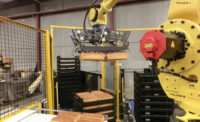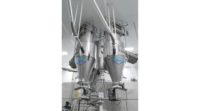Companies who make dough handling equipment like dividers, depositors and rounders say their customers want equipment that provides safety and sanitation, automation and the resulting labor savings, gentler handling of dough, and the flexibility to run a mix of high-throughput, and smaller, niche lines, depending on the job.
Trend insights
“Safety and sanitation are probably the biggest things,” says Andrew McGhie, director of sales for Shaffer, part of Bundy Baking Solutions, Urbana, OH. “The pendulum of building dedicated, high-throughput vs. more variety and niche lines is now swinging back to the niche product.” He notes that when running a variety of different products, you need the ability to clean equipment more quickly.
Customers of Koenig Bakery Systems, Ashland, VA, generally ask for wider weight ranges and the ability to enable processing of doughs with different sorts of grains, fruits or chocolate chunks, says Richard Breeswine, CEO. “With all dividing systems, the demanded focus is currently on hygienic design, sanitation requirements and good machine usability.” He notes intelligent and automatic regulation of machines will also become increasingly important in order to better control dough levels or weights, for example, through sensors.
Reiser, Canton, MA, similarly has been hearing from customers about the sanitation and hygienic design, says John McIsaac, vice president, strategic business development. “Allergen changeovers enter into many of our conversations. Stainless steel construction and an easy-to-clean design with total access to the product path allows complete sanitation of the machine while eliminating any cross-contamination risks.”
Flexibility and versatility are the “name of the game” for customers of Unifiller, Delta, British Columbia, says Martin Riis, product manager. “Their customers change their requirements and their demands,” he says. “They want to be able to pivot on a dime and make the equipment utilized for something else.”
Safety and sanitation are so standard it’s almost second nature that customers expect them, Riis adds, while automation helps companies deal with shortages of skilled labor and training time. “We spend a lot of time on the interface simplifying and making it as easy as possible. They want something that can take that extra labor out.”
Rheon USA, Irvine, CA, hears from many customers asking for stress-free machines that do less damage to dough and make it feel more “homemade,” says John Giacoio, vice president of sales. “By the same token, we’re also asked about sanitary design, easier maintenance and quicker disconnects.” The company invites customers into the four “alpha sites” it owns, dubbed Orange Bakery, to test equipment and share their likes and dislikes. “We feel like we’re really in touch with what the baker is asking for,” he adds.
Customers of JC Ford, La Habra, CA, want automation, greater capacity, and cleanliness and hygiene, says Mike Minidis, sales engineer. “How do you make equipment within a certain price range that they can essentially spray down with bleach spray, without it rusting or corroding?”
Equipment updates
Baker Perkins Inc., Grand Rapids, MI, has drawn from research showing close links between dough-forming quality and cell count, says Keith Graham, marketing manager. The company recently released the Accurist 2.1 ram-and-knife divider, which uses a dough pressure sensor and servo control, and which produces cell count that’s up to 15 percent higher than standard dividers. This leads to softer, yet more-tear-resistant, dough along with improved volume, crumb development and color, he says.
The Baker Perkins conical rounder, designed to handle heavy dough pieces at high speed, features an open trough that shapes the pieces and conditions the surface with minimal structural damage, says Graham. “The driven discharge cone controls spacing to avoid doubles forming on the take-off conveyor.” These systems can handle a wide product variety, including large and small pans, multigrain, whole-grain, seeded, sandwich and hearth breads, as well as pizza, with throughputs ranging between 2,000 and 6,000 pieces per hour.
Lawrence Equipment, El Monte, CA, specializes in making turnkey systems for flat breads, including tortillas, roti, and pizza, says Glenn Shelton, vice president and general manager. After experimenting with testing with many different divider/rounders, the company has developed a strong preference for hydromechanical ram and piston dividers using only drum rounding.
As the market for flatbreads has evolved, so has the demand for both smaller- and larger-diameter products, which has an associated effect on dough ball weights, Shelton says. Lawrence has responded to these market’s demands, as producers seeking lines that are more flexible. The company has developed an expertise dividing medium to stiff doughs in small or large weights, without more than 1 percent variation and at high speed. Recent innovation has improved the work done in rounding by 25 percent, by using custom, larger-diameter rounding drums, he says.
Shaffer makes dough chunkers, pumps and conveyors, as well as moulders for bread lines and kibblers used to transfer crumbly dough from mixers, McGhie says. The company has recently upgraded the cutter profile of its chunker to improve a range of dough from soft to stiffer, while simultaneously switching the motors on its vertical conveyors to the bottom side to make them easier to service without a cherry picker or ladder. The company has also switched its horizontal and vertical conveyors from 8-inch to 24-inch belts, which helps to keep the dough in the middle of the belt. “This keeps it from getting everywhere else and minimizes cross-contamination,” he says.
Koenig has worked to customize its dividers and rounders based on customer requirements—for example, developing the Industrie Rex AW-H machine with a particular customer who had exacting hygienic requirements, and designing the Rex Futura Multi and Industrie Rex AW to fulfill broader U.S. market requirements, Breeswine says. The Rex Futura Multi dough divider and rounder can reach 9,000 pieces per hour and works well for hamburger and hot dog buns, as well as sub rolls, with a weight range of 0.6 to 8.6 ounces.
The Industrie Rex AW divider and rounder offers high weight accuracy, gentle dough processing and a small footprint, with a weight range of 0.99 to 12.33 ounces and an hourly capacity of 30,000 pieces in a 10-row operation, Breeswine says. The AW-H can reach 36,000 pieces and provides such hygienic features as lightweight retractable drawers integrated in the machine frame, and main drives that are encapsulated and completely separated from the dough area.
The Vemag dough divider from Reiser features double-screw pumping technology that provides high scaling accuracy with minimal work. The company has also recently improved the technology to facilitate how the dough travels into and through the double screw, achieving the same output at slower speed, meaning less wear-and-tear on the product, McIsaac says.
Reiser also has improved flow division, moving away from the use of valves with Reiser’s patented waterwheel flow divider that separates product into multiple lanes with equal portions, notes McIsaac. The “highly flexible” Vemag can be used to produce a wide range of bakery products, such as breads, rolls, buns, pizza dough and English muffins.
Unifiller has been improving upon its Uni-Dopositor cookie extruder, mostly concentrating on sanitary design, Riis says. “We design it in a way that all components in contact with products can come off the machine and go into the washer. And no tools are required. Operators on the floor can do it. It doesn’t need to be a dedicated maintenance or sanitation crew.”
Unifiller has also designed the machine in such a way that switching from one size or shape of cookie to another does not require an extensive overhaul of the machine’s parts, Riis says. “You can just replace the inserts. The speed of replacement saves money.”
Rheon offers the B4 Flex Divider, which allows for flexible dough width from one product to another, leading to a reduction in side trim, Giacoio says. “It used to be you had to account for the products with the widest dough band, and then with the narrower bands take in a lot more trim. It’s very handy to be able to adjust that dough width at the very beginning of the process.”
The company also offers the Punch Rounder, which Giacoio says simulates gentle hand-rounding of a dough ball, even to the point of being able to have “infinite” adjustment on how many times you touch the dough, or round it, he says. “One person might think this is perfectly round; another person might think its off-shape, and more artisan. Rheon is all about the stress-free, artisan look and handmade quality. That’s what our customers are asking for.”







